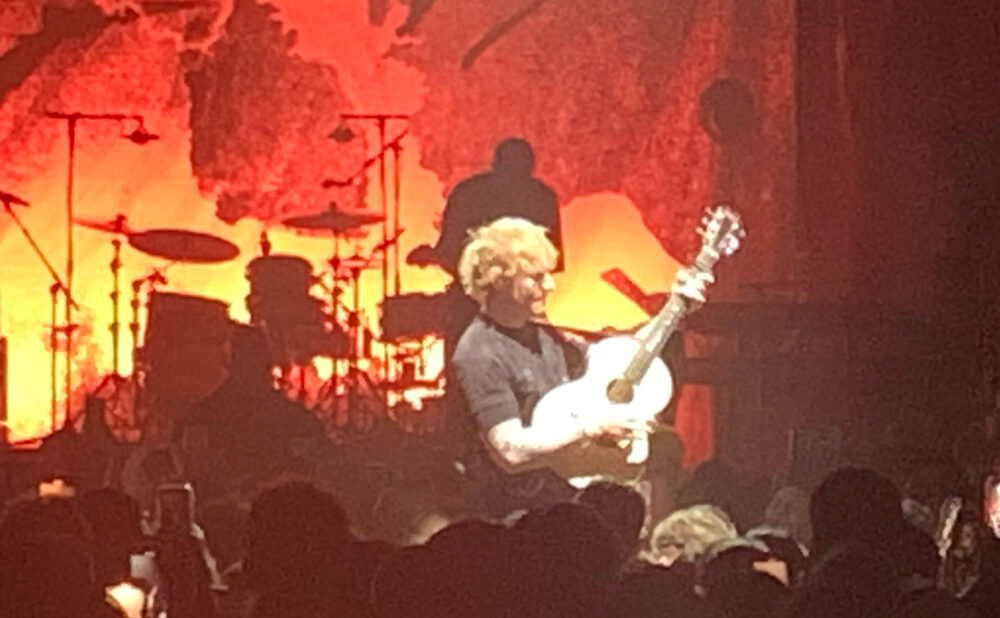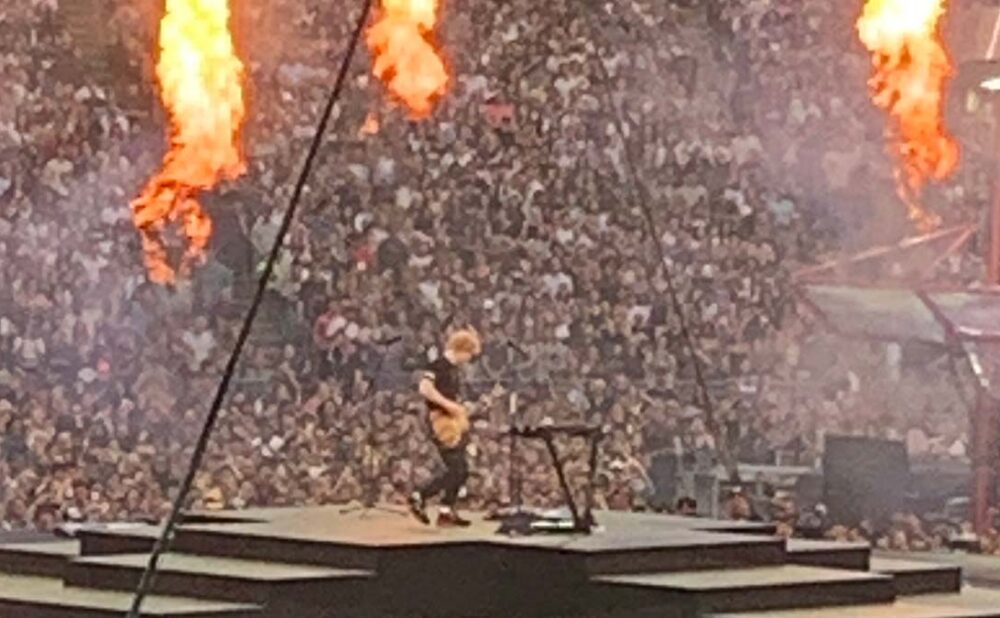Ed Sheeran offers unexpected comfort to grieving writer
Ed Sheeran plays Toronto club show and two stadium shows, reveals he’s still deeply grieving death of best friend.
Who: Ed Sheeran
Where: History Toronto
When: Fri., June 16
Vibe: Intimate, chatty and cathartic
Highlight: his singing and sharing
Rating: NNNNN (out of 5)
Who: Ed Sheeran
Where: Rogers Centre, Toronto
When: Sat., June 17; Sun., June 18
Vibe: big, joyous, fun
Highlight: Shawn Mendes joining him for two songs on night one after being away for a year
Rating: NNNN (out of 5)
“I know this seems like I’m just doing a gig, but these are really helping me personally, just playing songs,” says British pop star Ed Sheeran at his rare 2,500-capacity club gig last weekend at Toronto’s History. It’s a fraction of the size of the Rogers Centre, which he sold out the following two nights for a combined 100,000 or so tickets.
It helps me, too.
The stadium shows — both of which I attended — were everything a show of that size should be: big and celebratory and fun. But his intimate gig at History unexpectedly reached me personally as someone who has also experienced great loss. Sheeran uses the intimate setting to get very candid with the audience, sharing personal stories and feelings not told the following nights. Not everyone in the all-ages crowd (some small children likely seeing their first-ever concert) would get it, but I did.
As we see in the new four-part documentary series Ed Sheeran: The Sum of It All — which debuted May 3 on Disney+ — the 32-year-old married father of two is grieving. His best friend, Jamal Edwards, the entrepreneur behind SBTV, the YouTube platform showcasing new and rising talent, died suddenly on February 20, 2022, at age 31, from cardiac arrhythmia after taking recreational drugs.
His club show is about the hole in his life without Jamal (Sheeran talks about him so often, I feel he’s a man who now only needs one name) compounded by a pile-on of other major hardships he mentions, including his wife Cherry’s cancer diagnosis while she was six months pregnant, and a copyright infringement lawsuit over his 2017 mega-hit Shape of You.
Sixteen months later, Sheeran is still grieving. My dad died in February too, and five years, three months and three weeks later, I’m still grieving.
Since that time, I lost an uncle to age-related illness, an aunt to cancer, a good friend to suicide and a childhood friend to suicide — all while dealing with the unexpected struggle to make a living as a freelance music journalist for the first time since I started in this business at 18; the worry over my don’t-say-elderly mom, who lives alone in a house with stairs and pretends as if she’s as spry as an 18-year-old (she is not); and other stresses. We all have shit going on — even a guy with adoring fans and sales of more than 100 million albums.
The new – (“Subtract”), which came out May 5 concludes his “mathematical” pentalogy, which includes 2011’s + (“Plus”), 2014’s x (“Multiply”), 2017’s ÷ (“Divide”) and 2021’s = (“Equals”). The mostly acoustic final album “doesn’t belong in a stadium; it’s an album that was made to be played in rooms like this,” he explains.
(– (“Subtract”) is his sixth studio album; he injected No.6 Collaborations Project in 2019, his fourth.)
So, History is a far different show than Rogers Centre. He warns he’ll be playing – (“Subtract”), in its entirety, in sequence, for “quite a depressing hour,” followed by what he jokes is “Happy Hour”: the more danceable hits, like Shivers, Shape of You, Bad Habits and lilting love song, Perfect. He has a full band, including a six-piece string section, but, of course, plays many songs solo, using his trusty loop station to create the track live on the spot — something he’s been doing for 18 years (this is his first tour with a band, in fact, even if they’re used sparingly).
By contrast, his two shows at Rogers Centre are full-on, complete with a revolving stage, pyro explosions, the loop station, a band (when needed) and special guests, like his opening act Khalid (with whom he cut Beautiful People on the collab album) and a surprise appearance by Shawn Mendes (on the first night) who had been away from the stage for a year to take care of his mental health. (They pair up on Lego House and Mendes’s hit There’s Nothing Holding Me Back.)Sheeran wears a Toronto T-shirt, then switches to a Toronto Blue Jays jersey (the first night with “Mendes” on the back; the second with “Subtract”) and pulls out all the stops needed to entertain 50,000 people, pretty much all by his lonesome.
He mentions Jamal once, maybe twice. He is chatty but not deep and revealing.
But History is a heart-to-heart show. He needs to talk about the loss of his friend and knows we will listen. Many of us will also understand.
“This is a really cathartic thing for me to do,” he explains. “This album happened over a month period, and it was an extremely different period of life for me and my family. I found that whilst shooting the music videos and writing it, I was still getting really upset singing the songs and when songs are released, they suddenly belong to you guys — and actually playing these shows have made me come more to peace that these songs are just songs that I’ve written, rather than pieces of my life from that period of time.”
Jamal helped launch Sheeran’s career in 2010 on SBTV (the same year he released his Loose Change EP) with live performances of two songs he still plays today: You Need Me, I Don’t Need You, on which he raps, beatboxes and loops live on the spot, and the acoustic The A Team, his debut hit single. The two friends and former roommates rose to success together.
Sheeran got the news of Jamal’s passing the day after his wife was diagnosed with cancer. That’s a lot to deal with for any human. Treatment was able to be delayed until she gave birth to their second daughter, he says on stage, then she successfully underwent an operation. She is cancer-free now, going for regular check-ups every six months, but for a few weeks, “it was real terror,” he says.
Sheeran also had to deal with the Shape of You plagiarism suit at the time, which he won in April 2022 (not to be confused with the one this year for 2014’s Thinking Out Loud, which he also won — he threatened to “quit music” if he lost).
“It was all these happening, thing after thing,” he tells the audience. “In that month, every single thing that happened, where it was like, ‘This is really bad; I hope it doesn’t get worse than this,’ it sort of became comical that the next day it would get worse.” He wrote Salt Water, a dark, honest song about thoughts of suicide.
Recently — although he didn’t mention it at History — his grandmother died, on the first day of the copyright court case in the U.S., and he had to miss her funeral in her native Ireland on May 3; he won the suit on May 4. “Well, of course that would happen today of all days,” he told the press outside the courtroom.
Of Jamal, at History, he tells the rapt crowd, “I’m 16 months now since he’s passed away, and I still don’t feel okay with it and I don’t necessarily think that you have to be. Who’s to say what amount of time you’re meant to grieve for?
“As a culture now, everyone’s like, ‘Right, this is the time you’re allowed to be sad,’” he continues, “and then after then it’s this weird thing of like, ‘Oh, come on, mate, get back to it.’ And I think the grief is just something that we should live with and respect and be this thing that when we want to feel sad, we can feel sad, and if we want to feel happy about memories, be happy.”
Yes, yes, exactly that. I get it. I’d lost friends because I grieved “too long.”
I didn’t think I would connect with Sheeran. Usually, it’s Bruce Springsteen, whom I took my dad to see several times and who was also a favourite of the good friend who took his life (I still have a photo with him at summer camp, wearing a Springsteen T-shirt). I cried (quietly) the third time I saw his Springsteen on Broadway the year my dad died (the first two times were before my dad passed away, so his stories didn’t hit home until mine was gone too).
So, when I watched Ed Sheeran: The Sum of It All, the tragedy of him losing Jamal captured on film — the grief taking hold as this young man tried to hold it together on stage when he was so torn up over the loss — I cried during that too. The rap song he wrote for him, F64 (a nod to the 64 bars channel on SBTV) and performed for a music video is intense, his eyes squeezed shut and the unimaginable pain in his every movement.
“I got a life full of blessings, but this just breaks my fuckin’ heart,” he freestyles; and later, “Fuck’s sake, lately I’ve been crying so much my lungs ache.”
When he returns to the big stage, he tells the camera, “I was thinking, ‘I don’t want to cry in front of 78,000 people,’ and I found myself really close at times. It’s just mad. It’s just straight back to it. Fly home, go and do something really intense and then straight back to it. The show must go on.”
So here he is, back to it, on The +–=÷× Tour (pronounced “The Mathematics Tour”), plus doing more than a dozen – (“Subtract”) clubs shows in cities where he has stadium shows too. Go see him. If you’re grieving, it might help you too.
Grief is a funny thing. As a music journalist, music fan and profound lyric junkie, I notice when Bryan Adams tells a story about his dad and writes a song in his memory; I notice when Jim Cuddy tells the story of his friend who passed away and writes a song in his memory. I can’t get my feelings out in a three-minute song, immortalizing that person for all to hear so I listen, instead, maybe shed a tear, because I feel better that I’m not alone.
In his preamble for End of Youth, Sheeran tells History, “Death obviously makes you think about life a lot, and I know that’s obviously quite an obvious statement to say, but what it got me thinking about was how fortunate I was to be in my 30s and going through it for the first time. Obviously, it’s super fucked up happening, but I have friends who lost parents when we were teenagers and I had friends who lost parents before we reached the age of 10 and what I realized when I lost Jamal was that was when I became an adult.
“It was when it sort of flipped and adult stuff was happening to me and, therefore, I became an adult. It wasn’t necessarily when I turned 18; it was when I was going through adult things, and it made me think how cruel it is that kids have to deal with adult things before they’re meant to and how stuff like grief or depression or anxiety, these things end your youth in its tracks at whatever age. It could be 2, it could be 12, it could be 17, it could be 25 and I wrote this song reflecting on that.”
I tell people something similar; only, for me, my 30s long behind, it’s more that my life is separated into two: before dad died and after dad died. But Sheeran’s words made me realize how lucky I am to have had my dad for as long as I did and what a good one he was.
As Sheeran sings for Jamal in – (“Subtract”)’s Life Goes On:
A constant grey in the clouds
When I hear your name, I think of love
So, tell me how
How my life goes on with you gone
I suppose I’ll sink like a stone
If you leave me now
Oh, the storms will roll
Easy come, hard go
Then life goes on
You Might Also Like
André 3000’s ‘New Blue Sun Live’ a free-form sonic journey
Live, improvised jazz session affirms André 3000's multi-genre credibility
By Adriel Smiley







